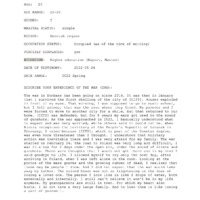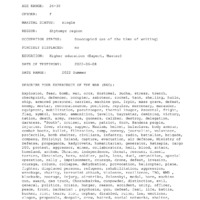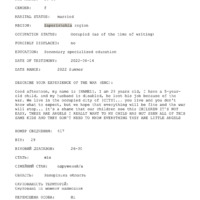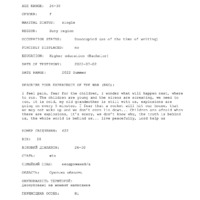Linguistics of Witnessing: Displacement, Memory and Translation in War Testimonies
Introduction
War shatters not only homes and homelands, but also the language through which people express their identities and suffering. In the interactive display Languages of Witnessing, visitors are invited to investigate how Ukrainian people, like Holocaust survivors before them, have had to translate their experiences—linguistically and culturally—into languages other than their own. These testimony, originally provided in Ukrainian and later translated into English, are artifacts of suffering and survival, laced with ethical and emotional intricacies.
This exhibit features four eyewitness narratives from the Narratives of War initiative, chosen for their moving depictions of language exile, identity fragmentation, and cultural translation. These stories reveal how survivors use language as both a shield and a scalpel, protecting their past while also dissecting their grief. Glowacka's idea of linguistic exile fits with this: each testimony can be seen as a "translation differend" (Lyotard), where language both helps and hurts the witness. The hesitant syntax, the fractured voice, and the decision to write in English are all acts of resistance and testimony.
This exhibit highlights a variety of themes, including the ethical implications of translating cultural terms, trauma, and identity. Serhii Zasiekin emphasizes that translation involves ethical representation of trauma, loss, and defiance, in addition to lexical accuracy. For example, phrases like Maidan and vyshyvanka resist simplicity; keeping them preserves their cultural identity and symbolic potency.
Finally, every act of witnessing involves a translation, not just between languages, but also between memory and meaning. Using the Omeka S platform, this show depicts the ethical burden of translation and the emotional labour of witness. It is both an archive and a prism, exposing how displaced individuals traverse imposed silences and create new language homes.
We want visitors to listen rather than read when we provide these testimonials, together with associated metadata and scholarly insights. They engage in the ethical act of secondary witnessing by amplifying voices that need to be heard and remembered.



